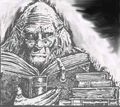|

d20 system Logo
The d20 System is a role-playing game system to which the company Myriador have converted a number of Fighting Fantasy gamebooks under licence from Wizard Books. Myriador use the trademarks Fighting Fantasy and the Fighting Fantasy logo with permission from Steve Jackson and Ian Livingstone. They use the trademarks "d20 System" and the "d20 System logo" with permission from Wizards of the Coast, a subsidiary of Hasbro, Inc.
Background[]
The d20 System is a role-playing game system published in 2000 by Wizards of the Coast and originally developed for the third edition of Dungeons & Dragons.[1] The system is named after the 20-sided dice which are central to the core mechanics of many actions in the game.
Open Licensing of the d20 System[]
Much of the d20 System was released as the System Reference Document (SRD) under the Open Game License (OGL) as Open Game Content (OGC), which allows commercial and non-commercial publishers to release modifications or supplements to the system without paying for the use of the system's associated intellectual property, which is owned by Wizards of the Coast.[1] The original impetus for the open licensing of the d20 System was the economics of producing role-playing games. Game supplements suffered far more diminished sales over time than the core books required to play the game. Ryan Dancey, Dungeons & Dragons brand manager at the time, directed the effort of licensing the new edition of Dungeons & Dragons through the d20 System Trademark, allowing other companies to support the d20 System under a common brand identity. This is distinct from the Open Game License, which simply allows any party to produce works composed or derivative of designated Open Game Content. Theoretically this would spread the cost of supplementing the game and would increase sales of the core books, which could only be published by Wizards of the Coast under the Dungeons & Dragons and d20 System trademarks. (To this end, the SRD does not include rules for character creation and advancement.) The marketing theory behind the d20 System and its associated licenses is network externalities; support for the core rules would become an external expense rather than one incurred by Wizards of the Coast, but would promote the sales of the company's core rulebooks.
Fighting Fantasy and Myriador[]
Myriador began by converting Fighting Fantasy gamebooks into d20 System modules. The first to be converted were The Warlock of Firetop Mountain and Caverns of the Snow Witch. These were launched by Myriador at Gen Con Europe on the 18th April 2003 and apparently were well received by gamers at the convention.[2]
Steve Jackson signed copies of his books, the re-releases by Wizard Books, and the new d20 Fighting Fantasy scenarios produced by Myriador, along with author Jamie Wallis, who produced the conversions, as well as the artists. In the conversions, Myriador used the same Fighting Fantasy logo used by Wizard Books, and used the same artwork as on the Wizard Books re-releases. At Gen Con Jackson played the d20 conversion of The Warlock of Firetop Mountain, the first time he had ever played any d20 game. The scenario was run by its author, Jamie Wallis, who pitted Steve and Mike Dymond (Myriador's MD) against the many perils found within the Warlock's lair. Dymond said "Overall the weekend was a great success ... We sold a good number of modules, Warlock selling a little better than Caverns. The response from the public was fantastic, many gamers remember Fighting Fantasy fondly, often it was their introduction into role-playing."[2]
Conversions[]
The following books have thus far been converted:
- The Warlock of Firetop Mountain
- Caverns of the Snow Witch
- Deathtrap Dungeon
- Sorcery 1: The Shamutanti Hills
- Trial of Champions
- Sorcery 2: Kharé - Cityport of Traps
- Forest of Doom
- Sorcery 3: The Seven Serpents
